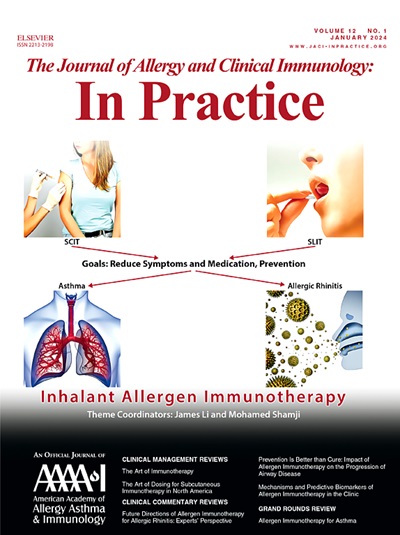Patient-Reported Outcome Measure Development and Validation: A Primer for Clinicians
IF 8.2
1区 医学
Q1 ALLERGY
Journal of Allergy and Clinical Immunology-In Practice
Pub Date : 2024-10-01
DOI:10.1016/j.jaip.2024.08.030
引用次数: 0
Abstract
A comprehensive definition of health includes the assessment of patient experiences of a disease and its treatment. These patient experiences are best captured by standardized patient-reported outcome (PRO) instruments. A PRO is reported directly by the patient (or caregiver) and provides the patient’s perspective into how a disease and its treatment impact their lives. PRO instruments are typically standardized, validated questionnaires with items that are scaled and can be combined to represent an underlying health-related construct such as physical, social, and role functioning, psychological well-being, symptoms, pain, and quality of life. Over the past few decades, PROs have become increasingly used in clinical trials as endpoints to better understand treatment benefits from the patient’s perspective and in clinical practice to identify unmet needs of patients, health risk surveillance, and monitor outcomes of care. In this paper, we describe the process for developing standardized PRO instruments, from conceptual model development through instrument validation.
患者报告结果测量的开发与验证:临床医生入门指南》。
对健康的全面定义包括评估患者对疾病及其治疗的体验。标准化的患者报告结果(PRO)工具最能反映患者的这些体验。患者报告结果由患者(或护理人员)直接报告,提供了患者对疾病及其治疗如何影响其生活的看法。患者报告结果工具通常是标准化的、经过验证的调查问卷,其中的项目可以按比例进行组合,以代表与健康相关的基本结构,如身体、社会和角色功能、心理健康、症状、疼痛和生活质量。在过去的几十年中,PROs 已越来越多地应用于临床试验中,作为从患者角度更好地了解治疗效果的终点,以及在临床实践中用于确定患者未满足的需求、监控健康风险和监测护理效果。在本文中,我们介绍了从概念模型开发到工具验证的标准化 PRO 工具的开发过程。
本文章由计算机程序翻译,如有差异,请以英文原文为准。
求助全文
约1分钟内获得全文
求助全文
来源期刊

Journal of Allergy and Clinical Immunology-In Practice
ALLERGYIMMUNOLOGY-IMMUNOLOGY
CiteScore
11.10
自引率
9.60%
发文量
683
审稿时长
50 days
期刊介绍:
JACI: In Practice is an official publication of the American Academy of Allergy, Asthma & Immunology (AAAAI). It is a companion title to The Journal of Allergy and Clinical Immunology, and it aims to provide timely clinical papers, case reports, and management recommendations to clinical allergists and other physicians dealing with allergic and immunologic diseases in their practice. The mission of JACI: In Practice is to offer valid and impactful information that supports evidence-based clinical decisions in the diagnosis and management of asthma, allergies, immunologic conditions, and related diseases.
This journal publishes articles on various conditions treated by allergist-immunologists, including food allergy, respiratory disorders (such as asthma, rhinitis, nasal polyps, sinusitis, cough, ABPA, and hypersensitivity pneumonitis), drug allergy, insect sting allergy, anaphylaxis, dermatologic disorders (such as atopic dermatitis, contact dermatitis, urticaria, angioedema, and HAE), immunodeficiency, autoinflammatory syndromes, eosinophilic disorders, and mast cell disorders.
The focus of the journal is on providing cutting-edge clinical information that practitioners can use in their everyday practice or to acquire new knowledge and skills for the benefit of their patients. However, mechanistic or translational studies without immediate or near future clinical relevance, as well as animal studies, are not within the scope of the journal.
 求助内容:
求助内容: 应助结果提醒方式:
应助结果提醒方式:


